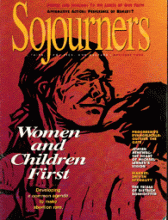Art and social conscience don't always make comfortable bedfellows. If the border between aesthetics and didacticism becomes blurred, the result is a humorless but laughable screed. Of course, there are exceptions-Picas-so's "Guernica" comes to mind, as do the novels of Dickens, which, despite their flaws, negotiated that border to bewitch us with their storyteller's art. The secret of success is, I believe, for the artist to begin with the righteous cause and then forget it, submerging it and the self in the pleasure and discipline of creation. Composer Scott Robinson seems to have done just this in his cantata, The Final Statement of Warren McCleskey. (The source material was taken from a transcript published in the January 1992 issue of Sojourners . Regular readers will recall Joyce Hollyday's coverage of the controversial case in that and the July 1987 issue. McCleskey's execution, based on questionable evidence, has been used as an example of racial discrimination in the use of the death penalty.)
Robinson, a native of Syracuse, New York, now living in Palmyra, Pennsylvania, received a commission from the Lancaster Chamber Singers in 1992 to compose a piece for the group when its director, Jeffrey Riehl, heard Robinson's choral work, Child of Our Time. A grant from the City of Lancaster Arts Council helped fund the performance, held at the Brightside Baptist Church in Lancaster.
Robinson had followed the McCleskey case and was especially intrigued by the transcript of the prisoner's final words and the ritual of the execution, including the words of the warden and the prison chaplain. He decided to set the whole thing, verbatim, to music. "McCleskey's style of speaking is lyrical; it has a liturgical rhythm," Robinson says.
He set all of McCleskey's words for a mixed chorus; the part of the warden is sung by a baritone soloist and the chaplain by a tenor. The work is accompanied, starkly, by the unusual combination
Read the Full Article
